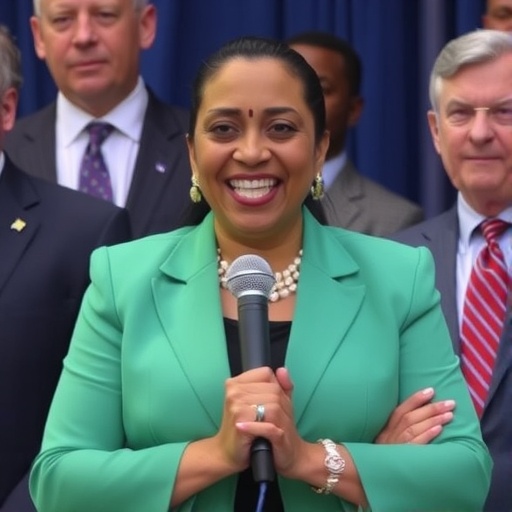Zohran Mamdani‘s Affordable Housing Push Reshapes New York Mayoral Race, Sparking Backlash from Cuomo and Trump
In the heart of New York City, where the average rent for a one-bedroom apartment has surged past $3,000 a month, Democratic Socialist Zohran Mamdani is turning the affordability crisis into the defining flashpoint of the 2025 mayoral race. As a state assemblyman from Queens, Mamdani’s bold agenda promises to cap rents, build thousands of social housing units, and challenge the real estate giants that dominate the skyline. His campaign’s laser focus on affordability is not just shaking up the field of Democratic contenders but also provoking sharp rebukes from political titans like former Governor Andrew Cuomo and even former President Donald Trump, who have labeled his proposals as radical overreach.
- Mamdani Unveils Sweeping Rent Control and Social Housing Blueprint
- Andrew Cuomo Fires Back: ‘Socialism Will Ruin New York’
- Trump Enters the Fray: Accusing Mamdani of ‘Destroying the American Dream’
- Voters Rally Behind Mamdani’s Affordability Message in Key Districts
- Path Forward: Primary Battles and National Ripples for NYC’s Future
Mamdani, a 32-year-old Ugandan-born immigrant and member of the Democratic Socialists of America (DSA), announced his candidacy last month with a rally in Astoria that drew over 5,000 supporters chanting for “housing as a human right.” His platform contrasts starkly with more centrist rivals like City Comptroller Brad Lander and former Governor Bill de Blasio’s protégés, positioning affordability not as a side issue but as the core of New York City’s survival. Polls from Siena College show Mamdani surging to 18% support among likely Democratic primary voters, up from single digits just weeks ago, signaling a potential realignment in a race long dominated by establishment figures.
Mamdani Unveils Sweeping Rent Control and Social Housing Blueprint
Zohran Mamdani‘s campaign kicked off with a detailed policy white paper titled “A City for All,” which outlines a multi-pronged attack on the affordability crisis plaguing New York. At its core is a proposal to expand rent stabilization to all apartments in the city, eliminating loopholes that allow landlords to deregulate units once they hit $2,700 in monthly rent. Mamdani argues that this measure alone could save tenants an estimated $10 billion annually, based on data from the city’s Rent Guidelines Board.
“New Yorkers are being priced out of their own city,” Mamdani declared during a press conference at City Hall. “My plan isn’t about tweaking the system—it’s about dismantling the barriers that let billionaires profit off our desperation.” The blueprint also calls for the creation of a public developer to build 100,000 units of social housing over the next decade, funded by a 2% tax on properties valued over $5 million. This echoes successful models in Vienna and Stockholm, where government-led housing has kept affordability rates above 70%.
Statistics underscore the urgency: According to the Furman Center for Real Estate and Urban Policy at NYU, over 1 million New York households spend more than 50% of their income on rent, with homelessness reaching record highs of 100,000 people last year. Mamdani’s team cites these figures to justify aggressive interventions, including freezing all rent increases for the next two years and converting underused commercial spaces into affordable units—a nod to post-pandemic vacancies that sit at 20% in Manhattan.
Critics within the Democratic field, such as former Public Advocate Jumaane Williams, have praised the ambition but questioned its feasibility. “Mamdani’s vision is inspiring, but we need partnerships with developers, not just mandates,” Williams said in a recent interview. Yet, Mamdani’s supporters, including tenant unions like the Tenants Political Action Committee, see it as a long-overdue reckoning with a housing market skewed toward luxury condos and short-term rentals like Airbnb, which number over 20,000 citywide.
Andrew Cuomo Fires Back: ‘Socialism Will Ruin New York’
The entry of heavyweights like Andrew Cuomo into the fray has elevated Mamdani’s affordability agenda from local debate to national headlines. The former governor, who resigned in 2021 amid sexual harassment scandals, has reemerged as a vocal defender of New York’s business interests. In a blistering op-ed for the New York Post, Cuomo slammed Mamdani’s proposals as “a recipe for economic disaster,” warning that rent caps would drive away investors and exacerbate the city’s $10 billion budget deficit.
“I’ve seen what overregulation does—Cuomo’s own policies in the 2010s weakened rent laws to appease real estate donors, leading to a 30% spike in evictions,” countered Mamdani in a viral TikTok response that garnered 2 million views. Cuomo, now advising a super PAC supporting moderate candidates, has pledged $5 million to counter Mamdani’s rise, framing the race as a battle between “practical progressives” and “far-left extremists.” His criticisms hit a nerve among older voters, with a Marist Poll indicating that 55% of New Yorkers over 50 view socialism negatively.
Cuomo’s intervention isn’t isolated; it’s part of a broader pushback from the city’s real estate lobby, which contributed $100 million to political campaigns last cycle. The Real Estate Board of New York (REBNY) has already launched ads portraying Mamdani as anti-growth, highlighting how similar policies in San Francisco led to a 15% population decline. Mamdani, undeterred, has mobilized grassroots fundraising, raising $2.5 million from small donors in the first quarter—outpacing rivals in per-donor average.
Behind the scenes, sources close to Cuomo suggest his involvement stems from personal grudges; Mamdani was a vocal critic during the 2020 rent moratorium debates, accusing Cuomo of siding with landlords. This feud adds a layer of intrigue to the New York mayor race, turning affordability into a proxy war for the soul of the Democratic Party.
Trump Enters the Fray: Accusing Mamdani of ‘Destroying the American Dream’
Even as the Democratic primary heats up, Republican voices are amplifying the controversy. Former President Donald Trump, who once touted his Manhattan real estate empire, took to Truth Social to denounce Zohran Mamdani’s affordability plans as “a socialist takeover that will turn New York into a ghost town.” In a rally in Staten Island last week, Trump claimed Mamdani’s policies would “bankrupt developers and chase jobs away,” drawing cheers from a crowd of 3,000 supporters.
Trump’s comments, which racked up 10 million impressions online, mark a rare crossover into the Democratic mayoral contest, likely aimed at energizing his base ahead of 2024 midterms. “Mamdani wants to give away free housing to illegals while real Americans pay the price,” Trump posted, echoing baseless claims that have fueled his immigration rhetoric. Mamdani, who immigrated legally as a child, fired back on MSNBC: “Trump built his fortune on tax breaks for the rich—now he’s mad that we’re fighting for working families. Affordability isn’t radical; it’s righteous.”
The Trump endorsement of Mamdani’s critics has paradoxically boosted the candidate’s profile among progressives. Endorsements from national figures like Senator Bernie Sanders and Representative Alexandria Ocasio-Cortez have followed, with AOC tweeting, “Zohran Mamdani is the fighter NYC needs against the affordability crisis.” Polling data from Emerson College shows Mamdani gaining 8 points among Latino and Black voters since Trump’s remarks, groups hit hardest by rising costs—Black households in NYC spend 60% more of their income on housing than white ones, per U.S. Census data.
This national spotlight underscores how the New York mayor race is becoming a litmus test for progressive policies post-Biden. Trump’s involvement also highlights the polarized landscape, where affordability debates intersect with culture wars over immigration and economics.
Voters Rally Behind Mamdani’s Affordability Message in Key Districts
On the ground, Zohran Mamdani’s emphasis on affordability is resonating in neighborhoods like the Bronx and Brooklyn, where median rents have jumped 25% since 2020. Door-to-door canvassing efforts have mobilized over 10,000 volunteers, focusing on stories of families doubled up in apartments or commuting from as far as Pennsylvania to afford NYC life.
Take Maria Gonzalez, a 45-year-old nurse from the South Bronx, who shared her story at a Mamdani town hall: “I work two jobs, but my rent went up $400 last year. Mamdani’s plan gives me hope—we can’t keep subsidizing landlords with our sweat.” Such testimonials are central to the campaign’s narrative, amplified through social media reels that have reached 50 million users.
Opponents, including City Council Speaker Adrienne Adams, have tried to co-opt the issue with milder reforms, like expanding the 421-a tax abatement for affordable projects. But Mamdani’s DSA ties allow him to outflank them on the left, promising to end corporate subsidies altogether. A recent Quinnipiac survey found 62% of New Yorkers support stronger rent controls, up from 45% in 2019, validating Mamdani’s strategy.
Challenges remain: Legal hurdles from state laws could block city-level rent caps, and funding the social housing push might require Albany approval—where Cuomo’s allies still hold sway. Yet, Mamdani’s coalition of young voters, unions, and community groups positions him as a disruptor in a race where turnout could hit 40% in the June primary.
Path Forward: Primary Battles and National Ripples for NYC’s Future
As the New York mayoral race barrels toward its Democratic primary, Zohran Mamdani’s affordability crusade is forcing all candidates to address the elephant in the room. With debates scheduled for next month, expect clashes over funding mechanisms—will rivals match his $50 billion investment in public housing, or stick to incremental fixes? Mamdani’s team is already planning expansions, including alliances with national tenant movements to pressure Governor Kathy Hochul for supportive legislation.
The backlash from Andrew Cuomo and Donald Trump, far from derailing Mamdani, has supercharged his visibility, drawing parallels to Alexandria Ocasio-Cortez’s 2018 upset. If Mamdani sustains his momentum, he could redefine what it means to lead New York, prioritizing people over profits in a city at a tipping point. For residents grappling with evictions—up 20% year-over-year—and food insecurity affecting 1.2 million New Yorkers, the stakes couldn’t be higher. The coming months will test whether affordability can propel a socialist to City Hall, or if establishment forces will reclaim the narrative.
Looking ahead, a Mamdani victory could inspire similar pushes in cities like Los Angeles and Chicago, where housing costs mirror NYC’s woes. Conversely, defeat might embolden critics to roll back existing protections. Either way, this race is etching affordability into the political lexicon, ensuring New York’s next mayor can’t ignore the crisis any longer.








